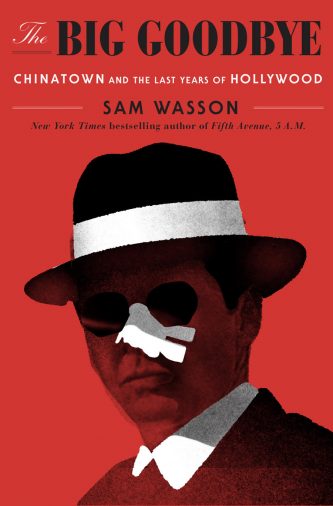 By SAM WASSON (Flatiron Books; 2020)
By SAM WASSON (Flatiron Books; 2020)
This book is ostensibly about the making of CHINATOWN (1974), but its true concerns are Hollywood in the early 1970s and one of that milieu’s most contentious figures: one Roman Polanski. Polanski may not be too popular these days but continues to exert an undeniable hold on the media, as evinced by his outsized presence in this book—a large portion of which is taken up with his life story—and the fact that the online excerpts from it all seem to focus on Polanski-centered portions.
The book’s Polanski-centric bent announces itself in the opening chapter, which fills us in the man’s Nazi-scarred background, his courtship of and marriage to Sharon Tate, and her murder by members of the Manson family. It was the latter event, author Sam Wasson argues, that first brought Polanski together with his future CHINATOWN collaborators Robert Evans, Jack Nicholson and Robert Towne, even if that connection (in Towne’s case) was indirect. The killings of Sharon Tate and her companions, which are widely credited with ending the carefree 1960s once and for all, was apparently the catalyst for the nostalgia for past eras that would infect Towne, leading him to the detective novels of Raymond Chandler that inspired CHINATOWN, a movie whose lead role was always intended for Towne’s longtime pal Jack Nicholson.
Towne struggled with the screenplay for the next few years, eventually selling it to Paramount’s then-head Robert Evans. The latter recruited his ROSEMARY’S BABY collaborator Polanski to direct, who admittedly viewed the assignment as a job-for-hire. Yet Polanski was instrumental in rewriting what was initially an extremely messy script, helping pare it down to what has been proclaimed the greatest screenplay ever written—a verdict with which Wasson disagrees, blaming the screenwriting guru Syd Field for perpetuating it.
Virtually all the preceding info, and the subsequent dirt about CHINATOWN’S shoot, has been widely covered elsewhere (in Peter Biskind’s EASY RIDERS, RAGING BULLS and the numerous Roman Polanski and Jack Nicholson biographies, not to mention the equally varied DVD supplements). Wasson, however, does come up with one authentic revelation: the existence of a Robert Towne writing partner named Edward Taylor, who worked quite extensively on CHINATOWN, as he apparently did on all of Towne’s scripts, yet never received any screen credit. Wasson traces this mysterious relationship back to Towne and Taylor’s college years, when the two were roommates, to the 2013 death of Taylor, at whose funeral Towne gave the following eulogy: “Much has been shared. Some of which should not be shared.”
The subtitle makes clear that Wasson had more on his mind than just the making CHINATOWN. He also explores its aftermath, during which Hollywood transformed from the classy business it was in the early 1970s to the high concept ruled endeavor it became. The fortunes of its creators likewise fluctuated, with Evans living out much of the remainder of his life an embittered, drug addicted recluse. Nicholson did better, but had the ignominy of directing and starring in THE TWO JAKES, the dire 1990 follow-up to CHINATOWN (whose production is briefly covered here). I think we all know what happened with Polanski, the particulars of which Wasson fills in with reasonable, though not lascivious, thoroughness (he also includes a recollection by CHINATOWN’S initial composer Philip Lambro about finding a circled adult newspaper classified ad in Polanski’s cutting room, apparently from a fifteen year old girl seeking a “relationship with European man in forties”). It’s Towne who comes off the worst, becoming, according to this book, an irredeemable wife-beating scumbag after being introduced to cocaine in the late seventies.
This is all set down in a highly expansive, novelistic manner. I was a bit irritated by the author’s constant attempts at delineating the psychological states of his subjects, which aren’t always particularly complex or even convincing; in these pages Polanski, for instance, is constantly flashing back to his childhood, and his father telling him to “Shove off!” as he was marched away by Nazis. But THE BIG GOODBYE is worth reading, being a mostly strong biography of an authentic masterpiece of American cinema, and a provocative depiction of the passions and crimes of Roman Polanski
